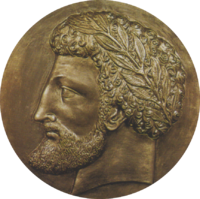Masinissa
As the son of a Numidian chieftain allied to Carthage, he fought against the Romans in the Second Punic War, but later switched sides upon concluding that Rome would prevail.[9] At the start of the Second Punic War, Masinissa fought for Carthage against Syphax, the king of the Masaesyli of western Numidia (present day Algeria), who had allied himself with the Romans.When Gaia died in 206 BC, his son Masinissa and his brother Oezalces quarreled about the inheritance, and Syphax was able to conquer considerable parts of eastern Numidia.This decision was aided by the move by Scipio Africanus to free Masinissa's nephew, Massiva, whom the Romans had captured when he had disobeyed his uncle and ridden into battle.With Roman backing, Masinissa established his own kingdom of Numidia, west of Carthage, with Cirta — present day Constantine — as its capital city.Masinissa and his sons possessed large estates throughout Numidia, to the extent that Roman authors attributed to him, quite falsely, the sedentarization of the Numidians.In one occasion, Masinissa had to march to assist one of his sons to fight off an attack of Hispanics, possibly the 153 BC Lusitanian invasion headed by Caucenus, who has been speculated to have been in league with Carthage.In any case, animated probably by an irrational fear of a Carthaginian revival, but possibly by suspicion of the victorious Masinissa's ambitions, the elderly Marcus Porcius Cato advocated among the Romans, finally with success, the destruction of Carthage.Based on descriptions from Livy, the Numidians began raiding around seventy towns in the southern and western sections of Carthage's remaining territory.
Masinissa IIKing of NumidiaMicipsaKing of the MassyliiLacumazesQueen Sophonisba of NumidiaGulussaMastanabalRegnal nameMassyliiHistory of AlgeriaPrehistoryAterian CultureIberomaurusian CultureCapsian cultureDjelfaTassiliAhaggarRokniaArcheology of AlgeriaAntiquityMadghacenJedarsPhoenician settlementAncient CarthageNumidiaPunic WarsJugurthine WarMauretaniaAfricaVandal KingdomMauro-Roman KingdomKingdom of the AurèsKingdom of AltavaPrefecture of AfricaExarchate of AfricaEarly African ChurchParteniaFossatum AfricaeGemellaeMiddle AgesArab conquestUmayyad CaliphateIfranidsMuhallabidsRustamidsIdrisidsAghlabidsFatimidsMaghrawasZiridsHammadidsAlmoravidsAlmohadsMarinidsHafsidsZiyyanidsRegency of AlgiersOttoman governorsKingdom of Beni AbbasKingdom of KukuSpanish OranBarbary piratesslave tradeFirst Barbary WarSecond Barbary WarFrench AlgeriaFrench conquestFrench governorsResistancePacificationEmirate of AbdelkaderFatma N'SoumerMokrani RevoltCheikh BouamamaWorld War IISétif and Guelma massacreAlgerian WarNationalism1958 crisis1961 putschÉvian AccordsIndependence referendumPieds-noirsHarkisOujda GroupContemporary eraFFS rebellion1965 coup d'étatBerber Spring1988 riotsAlgerian Civil WarTimelineMassacresHigh Council of StateCivil ConcordBlack SpringPeace CharterInsurgency in the MaghrebArab SpringHirak MovementCOVID-19 pandemicOutline of AlgeriaMilitary history of AlgeriaList of wars involving AlgeriaPostal history of AlgeriaHistory of North AfricaNumidianMassylii Berber tribesSecond Punic Wara kingdomregional powerNorth AfricaHistory of RomeScipio's DreamKingdom of NumidiaBattle of ZamaSophonisbatriumphConstantinePolybiusbreadbasketBerbersCarthageSyphaxMasaesyli